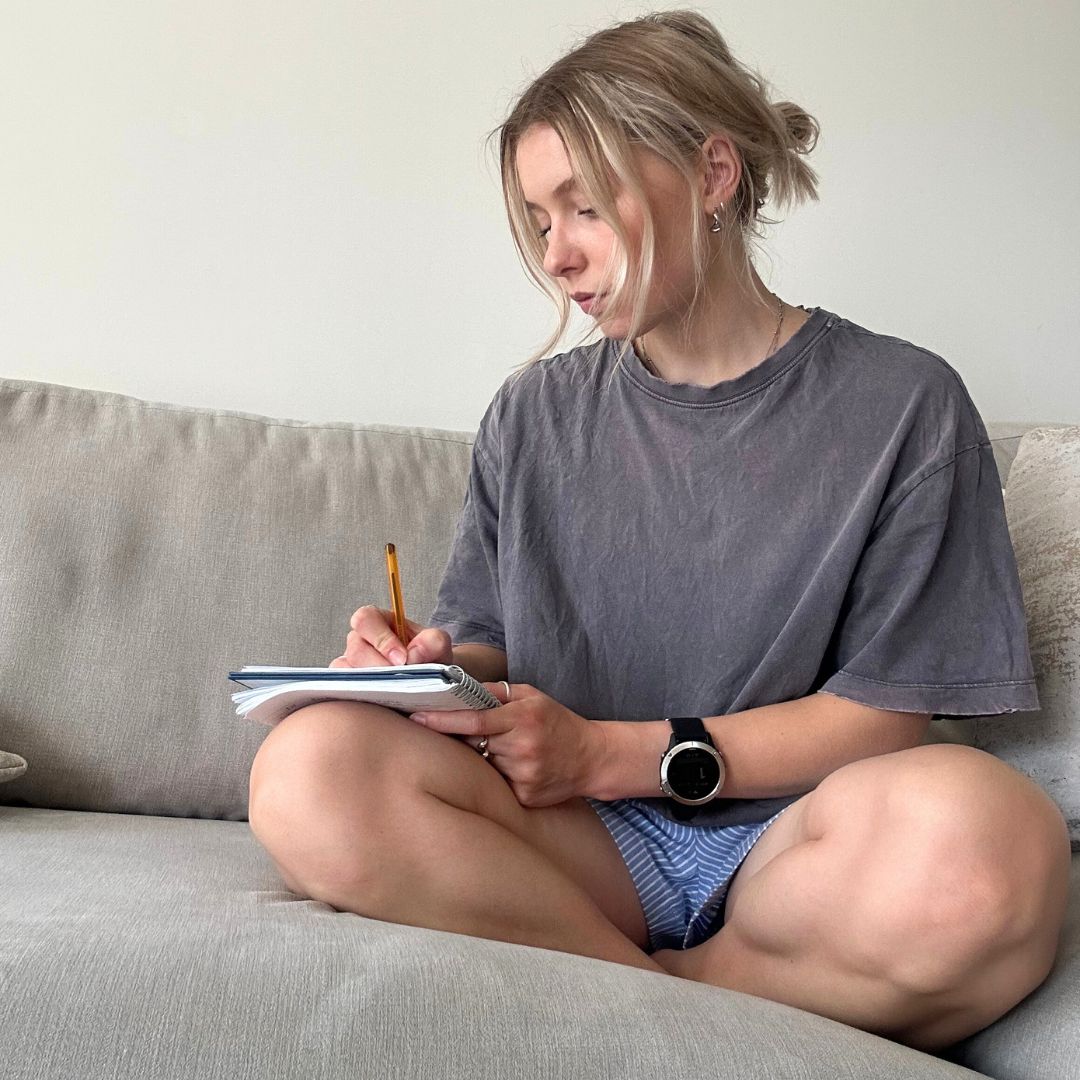
You can't scroll far on TikTok and Instagram without hitting some type of mental health and wellness trend, whether it's the 5-4-3-2-1 method, low dopamine morning routines or grounding therapy. That said, so many of us are still left feeling frazzled or worn down.
Case in point: Around 74% of us feel overwhelmed or unable to cope due to stress, according to a 2024 UKATA survey. And what day do we feel the most worried? Sunday, when seven out of 10 people feel overwhelmed with dread at the thought of the week ahead, according to government research.
The latest mind trend is aiming to put a stop to that. Enter: the Sunday reset routine. And the goal is to give you a step-by-step way to organise, plan and prep your life so that the week feels all the less daunting.
The promise of no more frazzle is pretty tempting to me - someone who always seems to operate in a state of panic and urgency. Disorganisation on my part may be the problem, but I think it's bigger than just me. The issue is that, no matter how much of my to-do list I tick off, there's always something added to it. And the more there is to do, the harder it is to feel accomplished and feel on top of my life, leaving me in a stress spiral.
A Sunday reset routine seems to be the solution - but as a wellness-routine sceptic, I needed to put it to the test before falling for the belief it could fix my life. Keep scrolling to see how I got on.
I tried a Sunday reset routine - and am a convert
What is a weekly reset routine?
To find out more about how to do a Sunday reset routine that will suit me, I turned to Kira Jones, personal trainer and wellness expert who's famed for her routine and productivity tips that don't make you feel worse. She's also the founder of gentle productivity app, Cacti Wellness.
"A Sunday reset routine is a chance to end the week strong, leave behind what’s not serving you and step into the new week with a clean perspective, space, body and mind," she tells me.
"While the Sunday reset is not one-size-fits-all and should vary from person to person, I recommend setting aside two-to-four hours on Sunday (or whatever day is the “rest day” in your schedule) and focusing on three categories: your body, your mind and your space."
The goal of your weekly reset routine is to finish up feeling on top of everything you need for the week. Imagine your life as a battery: if you go into the week at 50%, an intense week will drain you to below zero, leaving you unable to function. During a Sunday reset routine, you are recharging your life to 100%, so you can go into the week prepared for almost anything.
What are the benefits of a weekly reset routine?
1. Preparation
"Generally the Sunday scaries come from the fear of the unknown and feeling unprepared. The benefit of a Sunday reset is it prepares you for the week so you can show up for the week ahead," says Jones.
@hollyjai_ ♬ Valentine - Sped Up - Laufey
2. Calming
"Stress can often come from letting our thoughts run wild. Taking time to look after yourself and consider your needs can feel calming and put an end to the weekly anxiety spiral," she notes.
3. Orderly
We all know that our mind mirrors our environment, and a messy space can equal a messy mind. Taking time to clear your home, workspace or other environment can make your mind feel more orderly. If your physical space already exists in order, activities like journalling and brain dumping on a page can support a more orderly mind by ending the swimming thoughts.
4. Plan
If all you do in your Sunday reset routine is write a list of everything you did the week before and everything you plan to do in the coming week, you'll be onto a good thing. Just that can give you a sense of achievement and ambition to set you up for a good week.
@siffhaider ♬ original sound - Siff Haider
Despite these benefits, weekly resets can't exist without order in your day-to-day, says Jones. Ready for another analogy? "I think of my daily routine as a quick tidy and your weekly reset as a deep clean. The reset is most effective (and easiest) if you have a consistent daily routine that serves as maintenance throughout the other six days," she notes.
Who are Sunday reset routines best for?
Jones says that you can all benefit from a Sunday reset routine, even if you don't have a traditional schedule. "You can do this routine on any day, but ideally keep it to a consistent time each week when you have a block of uninterrupted time," she shares.
"When you’re first developing your routine, try a bunch of different practices and take what you like, leave what you don’t. Again, you want this to be something that makes you feel good and that you’ll actually stay consistent with. It can be built on over time to suit your changing needs."
How to do a reset on Sunday?
As Jones has said, there's no perfect reset routine for everyone. Instead, she's shared ideas for each of the three categories (body, mind, space) that you can work through to find what fits your needs.
1. Body
"Start with movement. Get in a good sweat and take time to stretch - I enjoy a low-impact workout and sauna session on a Sunday. Then, I rehydrate and nourish my body with good food. Finally, I pull out all of the stops with your self-care routine for my physical body. This could include exfoliating, washing and drying your hair or doing a hair or face mask that you don’t have time for on a daily basis. Whatever makes you feel like your best physical self," shares the expert.
2. Mind
"For your mind, I recommend journaling and meditating to centre yourself. I also like to write a to-do list and potentially get ahead on a bit of work so that I feel excited and prepared for what’s to come in the new week. Again, this doesn’t have to take up a lot of time, especially if you’re just getting started. Focus more on how you’re benefiting from the practice than how long you’re spending," she adds.
"A great beginner meditation that can be done from anywhere is box breathing; ideally five minutes following this pattern: inhale for four, hold for four, exhale for four, hold for four). Box breathing regulates your fight or flight response, brings your heart rate down, and helps calm a racing mind. For journaling, start by writing down a reflection on your week - major events, what you want to bring with you into the next week, what you want to release/leave behind."
@honeeliving ♬ sonido original - Vibes by Ley
3. Space
"Tidy up and reduce clutter," she recommends. "A cluttered space leads to a cluttered mind, so at the very least, put belongings away where they belong. If you have the time, it’s great to catch up on laundry, deep clean spaces that need it and even find some things to throw away or donate."
Try this: "I implement a “10-minute tidy” each night into my daily routine, so there’s less to do at the end of the week. Essentially, try to close out any lingering tasks so they don’t carry over into the new week."
I tried a Sunday reset - and felt it massively boosted my mood and productivity
Armed with Jones' tips, I went into my Sunday fully prepared to overhaul my life. Reader, that does not mean I was excited. In fact, the thought of a full reset made me feel even more scared than the thought of the Monday morning that was to come.
As with most things, starting was the hardest part. One second I was reluctantly spraying down my desk - the next I was moving around my room with a bin bag organising drawers that I hadn't opened in weeks.
I started with the space section of the day because I wanted to relax after my physical and mental self-care routines. By the time my desk was cleaned, floor hoovered and getting ready station was organised, I was knackered. It wasn't my usual Sunday exhaustion, during which I want to curl up in a ball and not face the world, but a satisfied tiredness from doing something good.
Then came the physical reset. I love a Sunday walk, so I went on a long stroll around my neighbourhood. Luckily, I live around a lot of green space, so I was able to soak in nature and feel detached from my real life. When I came home, I ran a warm bath filled with bubbles and Epsom salts - and used the fancy soap to wash.
Then came the best bit of the day: list making. I always try to make a to-do list every morning, but often my plans change (my work often depends on other people so, despite my best efforts, if I don't have what I need from others than I can't get what I planned done). Instead of writing a list about what I wanted to achieve in the next 24 hours, I wrote what I wanted to achieve in the whole week. Alongside the practical to-dos, I also listed how I wanted my list to feel: productive, calm, energised.
The real test for whether all of this worked was, of course, in the following week. It's always great to wake up on a Monday morning to a room that feels and looks great - and to sit at a desk that doesn't make you sigh at clutter.
But the best part of the week was the mindfulness I had done on my Sunday reset. I crossed off work throughout the week and kept re-reading my 'feelings' list as though it was a mantra remind myself to slow down and be positive. At the end of the week, I had an itemised reflection of everything I had achieved. And I did feel more organised and energised throughout the week.
The only downside to me is that Sunday is one of the only days of the week that I give myself time off work. As a freelancer, I'm tempted to work all of the time - and often do - so taking time out of my important 'me' time doesn't feel like something I can achieve every week. On the days I have plans with friends or want to be out of the house, I don't think I'll manage a full weekly reset.
I think that's okay - as Jones said, a weekly reset works best alongside daily resets. And I can easily break these tasks up and distribute them across my week during the times it's impossible to get to all of them at once.
Overall, I'd say a Sunday reset routine is pretty game-changing for something so simple. Taking time to look after yourself and your schedule means the week takes care of itself.
I love using my Productivity Method planner to plan out my week in perfect detail. With space for quick ticks, tasks and projects, as well as space to journal and manifest, it's the perfect goal-setting planner.







